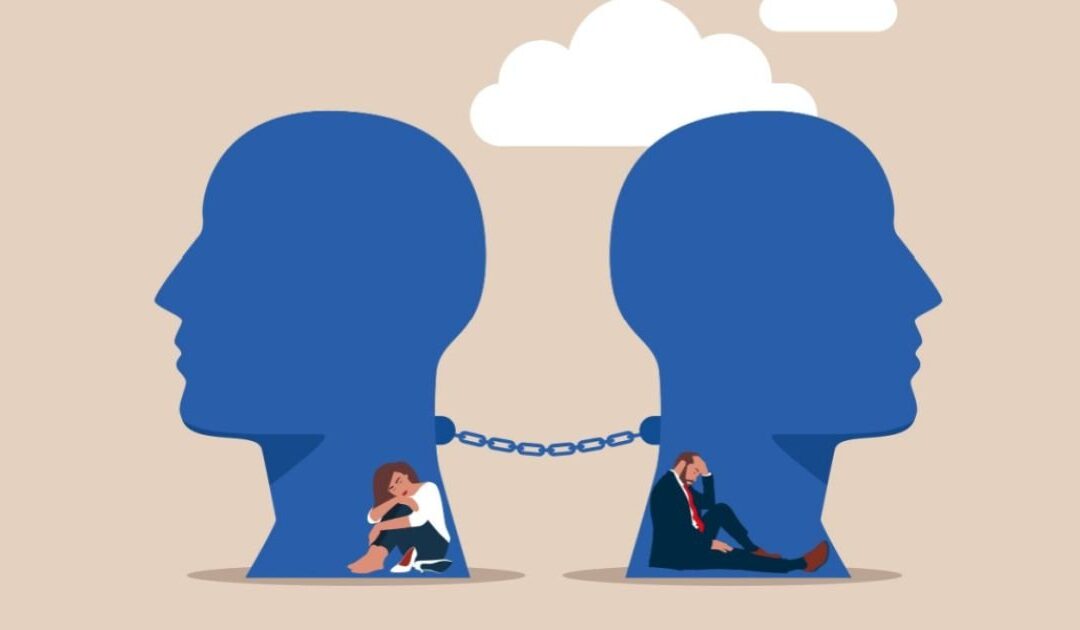Codependent relationships are intricate and often challenging dynamics that can deeply affect the mental, emotional, and even physical well-being of individuals involved.
In these relationships, one person typically prioritizes the needs and desires of the other to the detriment of their own well-being. Recognizing and recovering from codependency requires a nuanced understanding of its roots, symptoms, and steps towards healthier interactions.
This article delves into the complexities of codependent relationships, providing detailed examples and a comprehensive guide to recovery.
Defining Codependency
Characteristics of Codependent Relationships
Codependent relationships are marked by a series of behaviors and patterns, including:
- Excessive Caregiving: One partner assumes the role of caregiver, often to the detriment of their own needs.
- Low Self-Esteem: Codependent individuals frequently struggle with self-worth, relying on others for validation.
- Poor Boundaries: Boundaries are blurred or non-existent, leading to an enmeshment where personal identities are lost.
- Control Issues: There is often a need to control others to feel secure.
- Denial: Codependent individuals may deny their own needs and feelings.
- Dependency: Emotional reliance on the relationship is paramount, often fearing abandonment or rejection.
Identifying Codependent Relationships: Real-Life Examples
Example 1: The Caregiver and the Dependent
Consider Jane and Mark, a married couple. Jane, a nurturing person by nature, finds herself constantly attending to Mark’s needs. Mark, who struggles with depression, relies heavily on Jane for emotional support, validation, and decision-making.
Jane’s identity becomes increasingly tied to Mark’s well-being, leading her to neglect her own mental health, hobbies, and social connections. Despite feeling overwhelmed, Jane fears that setting boundaries or prioritizing her needs might make Mark’s condition worse or lead to conflict.
Example 2: The Overachiever and the Underachiever
In a different scenario, Emily and Tom are friends who have known each other since college. Emily is ambitious and driven, often excelling in her career and personal goals. Tom, on the other hand, has struggled with finding his path and frequently turns to Emily for guidance and support.
Emily takes on the role of mentor, sacrificing her time and energy to help Tom. She feels responsible for his successes and failures, and Tom depends on her to make important life decisions. This dynamic leaves Emily feeling drained and Tom lacking the motivation to become self-reliant.
Causes of Codependency
Family Dynamics
Many codependent tendencies stem from childhood experiences and family dynamics. Individuals who grow up in dysfunctional families, where emotional needs are unmet or parents are absent or abusive, may develop codependent behaviors as coping mechanisms.
For example, children of alcoholics often assume adult responsibilities early on, learning to prioritize others’ needs over their own.
Personality Traits
Certain personality traits, such as high empathy, low self-esteem, and a strong desire to please others, can predispose individuals to codependency. These traits make it challenging for them to assert their needs and maintain healthy boundaries.
Societal and Cultural Influences
Societal norms and cultural expectations can also play a role in fostering codependent behaviors. For instance, cultures that emphasize self-sacrifice and caregiving, especially among women, may inadvertently promote codependent dynamics.
The Impact of Codependent Relationships
Emotional and Mental Health
Codependent relationships can take a significant toll on emotional and mental health. The constant need to please others and the fear of conflict or abandonment can lead to anxiety, depression, and low self-esteem. Over time, the codependent individual may lose touch with their own identity and sense of self-worth.
Physical Health
The stress and emotional strain associated with codependency can also manifest in physical health problems. Chronic stress can weaken the immune system, leading to frequent illnesses.
Additionally, neglecting one’s own needs can result in poor self-care practices, such as unhealthy eating habits, lack of exercise, and inadequate sleep.
Relationship Dynamics
Codependency often perpetuates unhealthy relationship dynamics. The imbalance of power and responsibility can lead to resentment, frustration, and burnout. In extreme cases, the relationship may become abusive, with the codependent individual being manipulated or controlled by their partner.
Steps to Recover from Codependency
Acknowledgment and Acceptance
The first step towards recovery is acknowledging and accepting the presence of codependent behaviors. This involves honest self-reflection and recognizing the impact these behaviors have on one’s life and relationships.
Education and Awareness
Educating oneself about codependency is crucial. Understanding the root causes, characteristics, and consequences of codependent behaviors can provide clarity and motivation for change. Books, articles, and support groups can be valuable resources.
Seeking Professional Help
Therapy can be instrumental in addressing codependency. A licensed therapist can help individuals explore their past, identify unhealthy patterns, and develop healthier coping mechanisms. Cognitive-behavioral therapy (CBT), dialectical behavior therapy (DBT), and psychodynamic therapy are effective approaches for treating codependency.
Building Self-Esteem
Improving self-esteem is a fundamental aspect of recovery. This can be achieved through various means, such as setting and achieving personal goals, practicing self-compassion, and engaging in activities that bring joy and fulfillment.
Establishing Healthy Boundaries
Learning to set and maintain healthy boundaries is essential for overcoming codependency. This involves identifying one’s limits, communicating them assertively, and respecting the boundaries of others.
Developing Independence
Fostering independence and self-reliance is crucial. This may involve pursuing personal interests, making decisions autonomously, and developing a strong sense of self.
Creating a Support System
Building a support system of friends, family, and support groups can provide encouragement and accountability during the recovery process. Connecting with others who have experienced similar struggles can be particularly beneficial.
Practical Strategies for Overcoming Codependency
Example 3: Personal Reflection and Journaling
Sarah, who has realized her codependent tendencies, begins a journey of self-discovery through journaling. Each day, she writes about her feelings, experiences, and interactions.
This practice helps her identify patterns, understand her emotions, and track her progress in setting boundaries and asserting her needs.
Example 4: Assertiveness Training
Michael, who struggles with saying no and asserting his needs, enrolls in an assertiveness training course. Through role-playing exercises and practical techniques, he learns to communicate more effectively, express his desires, and stand up for himself without feeling guilty.
Example 5: Self-Care Routine
Lisa, a caregiver who often neglects her own needs, establishes a self-care routine. She schedules regular activities that nurture her physical, emotional, and mental well-being, such as exercise, meditation, hobbies, and socializing with friends.
Overcoming Challenges in Recovery
Relapse and Setbacks
Recovery from codependency is not always linear. Relapses and setbacks are common and should be viewed as part of the process rather than failures. It’s important to practice self-compassion and continue striving for progress.
Resistance from Others
Changing codependent behaviors can disrupt existing relationship dynamics. Partners, family members, or friends who have benefited from the codependent behavior may resist these changes. Open communication and, if necessary, involving them in therapy sessions can help navigate this resistance.
Patience and Persistence
Recovery takes time, and patience is essential. Consistent effort and perseverance are crucial for long-term change. Celebrating small victories and milestones can provide motivation and a sense of accomplishment.
Conclusion
Codependent relationships are complex and challenging, often rooted in deep-seated emotional patterns and past experiences. Recognizing and recovering from codependency requires a multifaceted approach that includes self-awareness, education, professional help, and practical strategies.
By building self-esteem, establishing healthy boundaries, and fostering independence, individuals can transform their relationships and lead more fulfilling, balanced lives.
Recovery is a journey, not a destination. It involves continuous self-reflection, growth, and adaptation. With dedication and support, those struggling with codependency can break free from unhealthy patterns and cultivate healthier, more satisfying relationships.

